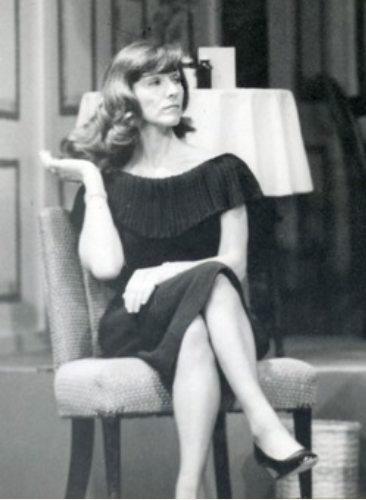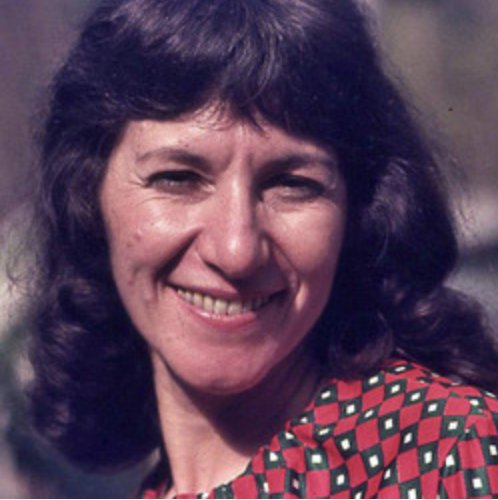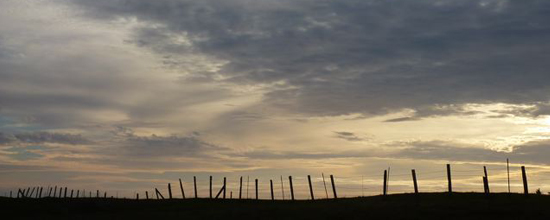Staff & Faculty In Memoriam
Remembering Billie Harris


Billie Harris (March 27, 1932 – April 8, 2022)
Billie Harris, beloved local radio broadcaster and actress, and HistCon department manager extraordinaire died aged 90 after a series of strokes.
Billie was born in London, England. Despite beginning her life enduring the Depression and the German bombings of WWII, she always described her early years as pleasant, with a baby brother to care for, piano and elocution lessons, and opportunities to pose as a children’s clothing model for newspaper advertisements. She attended the prestigious North London Collegiate School for Girls, where she excelled in languages and theater. She married in her early 20s and moved with her husband to California.
In 1967 they moved to Santa Cruz with their two young sons. Aubrey worked at the recently opened UCSC campus and directed the university’s instructional television program. Billie starred in many local theater productions, including The Cherry Orchard, The Lion in Winter, Cat on a Hot Tin Roof, Sweet Bird of Youth, Separate Tables, Misalliance, Arms and the Man, Charley’s Aunt, The Importance of Being Earnest, and other works. She also joined Shakespeare Santa Cruz, appearing in Richard II and Henry IV. She was prized by directors and praised by audiences for her crisp, British accent and her expressive vocal range. She also brought her acting skills to annual recitations from the Book of Jonah at Temple Beth El’s Yom Kippur services.
In the early 1970’s she began work at UCSC in administrative support roles, eventually becoming the program director for the History of Consciousness graduate program, where she remained until her retirement in 1992. Through her work at UCSC, Billie attracted a wide circle of devoted friends, including professors, staff, and students. She enjoyed hosting large parties in her home on Calvin Place in University Terrace, where she entertained guests with dirty limericks and rousing sing-alongs around the piano. She always made sure to invite UCSC students who were far from home and needed a sense of family.
In 1976, she accepted an invitation from station KUSP to participate in a Saturday morning children’s radio program, called Saturday’s Child. She modeled her portion of the program after a BBC radio show she had listened to as a child in England, called Listen with Mother, which featured a gentle-voiced woman reading children’s books. In homage to that show, Billie always began her readings by asking her radio audience, “Are you sitting comfortably?... Good. Then I’ll begin…” She brought to life a variety of books over the years, tending to favor classics such as Charlotte’s Web, The Wind in the Willows, C.S. Lewis’s Narnia series, and Alice in Wonderland; she also read each new Harry Potter book as soon as it was published. She was always delighted to encounter listeners young and old in the community who would recognize her voice and stop her on the street to ask, “Are you Billie Harris?” In the 1990s, she added a second program, From the Bookshelf, in which she would interview local authors about their newest publications. She remained on the air at KUSP until 2004 when Billie moved to the East Bay to be closer to her grandchildren.
She returned to Santa Cruz in 2017 and shortly thereafter resumed her weekly radio show reading children’s books again on the new local station, KSQD. Even when neuropathy robbed her of her ability to walk, she was determined to continue the show, making recordings in her apartment at Dominican Oaks and emailing them to the radio station for weekly broadcasts. Her last show (halfway through The Lion, the Witch, and the Wardrobe) was broadcast four months before her death.
In 1986, shortly after undergoing surgery for cancer, in an essay about her experience, she wrote, “I don't think anything matters except trying to be as good as I can in my own personal way of what ‘good’ means, which has very little to do with holiness, but rather more a question of being kind whenever I can, and doing my best not to hurt anyone if I can possibly help it.”
Billie was a model of the power of unconditional love, making life-long friends wherever she went, charming them all with her easy smile, and addressing them as “Darling.” She spent her final weeks surrounded by family and dozens of friends, full of gratitude for her life and for having had “so many wonderful people to love.”
She is survived by her sons, Stephen and Clifford, her daughters-in-law, Karyn and Gilliann, and her grandsons, Emilio and Nicco.
Professor Hayden White, (Doctor of Philosophy in History, University of Michigan), former Chair and Professor of the Department of the History of Consciousness
Tribute by James Clifford, Distiguished Professor Emeritus
Tribute by Susan Leigh Foster, Distinguished Professor at UCLA
Remembrances Page
New York Times obituary
Santa Cruz Sentinel obituary
Remembering Hayden White
James Clifford
Temple Beth El, Santa Cruz, CA
March 9th 2018
I was Hayden’s junior sidekick in 1978 when we both arrived in Santa Cruz as the History of Consciousness Board’s first full-time faculty. The campus was in the midst of radical reorganization, and the program suffered from problems of continuity and faculty commitment. Histcon was anarchic in both bad and good ways—the good ways having to do with its extraordinary students: idealistic, original, unwilling to bow to authority. As the new Chairperson, Hayden brought essential stability and a fresh vision. There were widespread fears that he would initiate a reign of “high theory” and academic professionalism. But he didn’t impose an orthodoxy or a required curhriculum, and it was soon apparent that he valued the unruly multiplicity of Histcon.
He resisted pressure to come up with a less outrageous name. And he adopted as departmental logo… the sphynx.
Hayden understood that a program like Histcon had to be open and experimental. It could not be disciplined, from above. It would be composed of the always-changing interests of its members, held together by intellectual passion and human connections. “Loyalty to people,” he used to say, “not to institutions.”
Of course, by then he was a world-renowned scholar and critic. I won't try to sum up his many contributions to understanding historical thought and practice. As an intellectual, he characteristically combined radical openness with intellectual rigor (“anarcho-formalism” I used to call it). This attitude was exactly what a program like Histcon required. We needed to let a hundred flowers bloom without sliding into “anything goes” relativism. Good intellectual work, Hayden knew, could take many forms. There was no sovereign theory or inherently virtuous approach.
Around 1980, when our dynamic Dean, Helene Moglen, offered Histcon two senior positions, but only if they were feminist scholars, Hayden said “why not?” Feminist theory had not been a part of his own thinking. But he recognized an emerging field with exciting possibilities.
This openness was evident in Hayden’s academic advising. He directed dissertations from all over the intellectual and political map. To mention only a few from the early years: Sharon Traweek was doing fieldwork among Physicists. Susan Foster disentangled the forms of dance. Jose Rabasa did close readings of 16th Century conquest narratives in Mexico. Chela Sandoval explored “oppositional consciousness” in contemporary Third World Feminism.
Hayden seemed interested in everything and (intimidating to a younger colleague) to have read everything! The only qualities he couldn't stand were literal mindedness and sanctimoniousness.
He knew how to provoke. I’ll never forget the stunned silence that greeted his advice to our first pro-seminar in 1978. “In our line of work,” he informed the students, “You have to love reading more than anything—more than food, more than politics, more than sex…”
Our late colleague Jack Schaar introduced Histcon’s new Chair to the campus newspaper: “Hayden White is a man who likes to walk up to an idea…and punch it in the nose.”
Working with Hayden (and this went for faculty as well as students) wasn’t always comfortable. He would step on what you held sacred. And he could be wickedly accurate. But we discovered that If you stayed with him, stayed in the conversation (and he so loved conversation), he would do anything for you. Watching him work with students, I was always amazed by how much he took on, how generous he could be. An incredible energy…
And if he wasn’t always gentle, he was exciting. What an oral performer he was!
Hayden had a special magic: often after a conversation with him you would come away inspired, feeling better about yourself. I still don’t know how he did it. Maybe it was just his way of taking your confused contribution to the life of the mind seriously.
Looking back, I’m most grateful for the freedom and the security I found in Hayden’s Histcon. Permission to thrive. (I’ve heard Donna say much the same thing.) It was a place where we were free from disciplinary conservatism. We could experiment and take risks.
For forty years, Hayden would be a model of deep collegiality and, with Margaret, a true friend. When Judith and I looked for someone to marry us in our Westside backyard Hayden was the obvious choice. Wearing a white, three-piece suit, he rose to the occasion magnificently, and without a trace of irony.
His was an amazing energy--a kind of life-force that swept up those around him.
It’s hard to accept that this energy is now gone. But we all take some of it with us, and if we follow Hayden’s example, we’ll find ways to pass it on.
For Hayden White’s Memorial
Susan Leigh Foster, Distinguished Professor of Dance, UCLA
PhD – History of Consciousness, 1981
The first thing I want to say about Hayden is that he was an absolutely fabulous dancer. He was articulate, enormously sophisticated in terms of rhythmic phrasing, and he could throw weight into his lanky frame, so as to bust one move after another. His dancing was super sexy. This needs to be said.
When Hayden came to History of Consciousness as its first Chair, he inherited a wild assortment of students who were largely running the program themselves. The only thing he had going for him in terms of infrastructural support was the illustrious voice of Billie Harris who answered the phone every time --- “History of Consciousness.” How could that not be credible?
Hayden proceeded to establish many other and more far-reaching reasons to believe in the program, what it might represent and achieve. He set about constructing an atmosphere of curiosity, generosity, and openness towards all kinds of inquiries. He offered students an entirely new way to discuss their projects with one another and to forge interdisciplinary connections by focusing on how different theoretical frameworks and methodological approaches could illuminate their individual research interests. He invited numerous guest speakers whose presentations served as a forum for further discussion and community building.
Together with Margaret, he created a warm and welcoming environment for the students, hosting many parties and receptions, always with good food and “liquid methodology.” And all of this while also writing “The Value of Narrativity in the Representation of Reality”, among other essays.
Hayden was an enthusiastic and willing listener, and he was always up for a discussion. He was endlessly inventive in terms of responses to students’ work; he borrowed with gusto ideas or whole frameworks for analysis from one disciplinary inquiry and transplanted them into another in order to see what they might reveal, and he dazzled with his capacity to represent succinctly the positions of any European or American philosopher and theoretician. “Deconstruction,” he once said, “is the process of taking something apart carefully in order to see how it works.”
Throughout he cast strong light on the structurings of power, giving voice to the underdog, the marginalized, and that which had been suppressed, oppressed or occluded. In accepting his honorary doctoral degree from the Frei Universitaet in 2016, he reminisced about his earliest years as a student, revealing to the packed auditorium that as a first-grader he had been smitten by the sweet smell of the teacher and resolved then and there that if reading books could improve the smell of his surroundings then that is what he would do.
Hayden adhered to a politics of sharing, once off-handedly observing in a comment that I share with every student: “If you hold onto an idea, you’ll never have another; if you give ideas away, you’ll always have more.”
Returning to Hayden’s “bodily” passions – besides dancing he also loved to cook and to eat. It was my great good fortune to tour northern Italy with Hayden, Margaret, and Juliana, and as yet another aspect of the education I received from him, watched with astonishment as he looked up every one fork, two star Michelin ranked restaurant in the region and then organized a tour of cultural sites that would fit in with these dining options.
I have been in touch with so many scholars around the world since Hayden’s passing who are all reading and re-reading his texts as a way to celebrate his life. We are so lucky to have known him in many more ways as well.
Professor Doctor Gary Lease (Doctor of Theology, University of Munich), former Chair and Professor of the Department of the History of Consciousness


